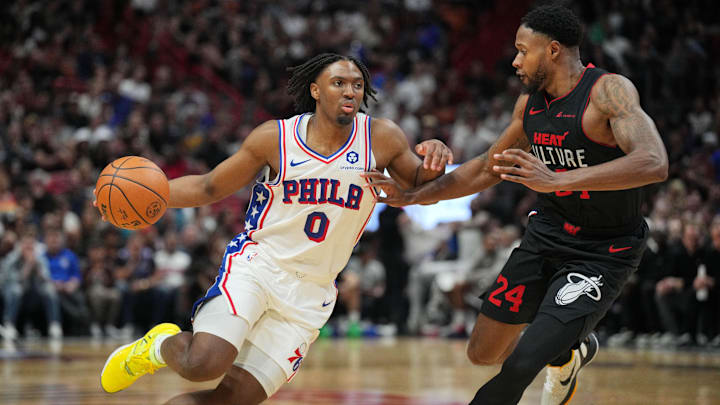There's More To Draft Evaluation Than Pure Skill

With the college season nearing its end, focus will shift towards the NBA draft, as players wrap up their collegiate careers, and head into the pre-draft process.
Here they will be met with a lot of takes. Like, a lot of takes.
"You can't have a single non-shooter on the floor!"
"Wingspan, wingspan, wingspan!"
"Defense makes or breaks your career!"
While every single take these guys here come from a place of some logic, the larger point isn't always true, or it lacks context.
Fact is, players who come into the league with a certain level of skill, the willingness to expand it, and an ego that allows him to do so, will get a significant bump up the draft boards.
Teams look at so much more than one or two things, and if a guy doesn't have an elite wingspan, but checks literally every other box for a specific team, odds are they're going to give him a real look, even if his middle name is T-Rex.
Take Tyrese Maxey, one of my own worst draft blunders.
I zeroed in on his lack of shooting, and decided that was it for me. He shouldn't be a priority.
It took him about 100 minutes to convince me just how of an idiot I'd been, as his motor more than made up for what he lacked in terms of floor spacing at the time.
(Don't get me started on how much he developed in that area. I'm still banging my head on the kitchen counter out of pure embarrassment.)
Players can show a different level of engagement in what they do. Some might love to rebound, and show great enthusiasm for it, but look outright disinterested if they're standing in the corner on offense.
Maxey's best NBA skill as it turned out? He never flips the off switch on anything. Whatever he does, he does with intent and a keen sense of focus.
Turns out, that's not just an NBA skill. It's one of the most coveted skills in the entire sport.
Which leads me to this.
The skill level of a prospect is nothing more than a snapshot. At 19 and 20 years old, there's no indication of said skill level worsening. In fact, quite the opposite.
It's the job of scouts to identify how a player sticks out, whether he's wired to get better, and to project where that skill level is going to be as he hits his mid-20's.
Essentially, we can't really use a player's skill level to much of anything. It comes down to how it's applied, the role he'll get on an NBA team, and about a million other factors, that gives a team a far more detailed profile of how this human being works.
Like, sure, it's nice that Stephon Castle from UCONN has great positional size, a large frame, and is seemingly capable of playing both guard spots.
But what might be more important to NBA teams is the fact that he's otherworldly coachable, and is team-oriented to the point where the Spanish national team would likely give him a flirtatious look.
So as we enter a period of much exaggeration, and much more overanalyzing generally, it's important to take a step back and remember there's more to each prospect than meets the eye.
Unless noted otherwise, all stats via NBA.com, PBPStats, Cleaning the Glassor Basketball-Reference. All salary information via Spotrac. All odds courtesy of FanDuel Sportsbook.
Want to join the discussion? Like Draft Digest on Facebook and follow us on Twitter to stay up-to-date on all the latest NBA Draft news. You can also meet the team behind the coverage.

Morten has managed to create a stable career for himself, launching Denmark's first weekly NBA radio show, and co-hosting a weekly NBA TV show. He's a seasoned basketball analyst and is experienced covering the league and its upcoming prospects.
Follow msjnba